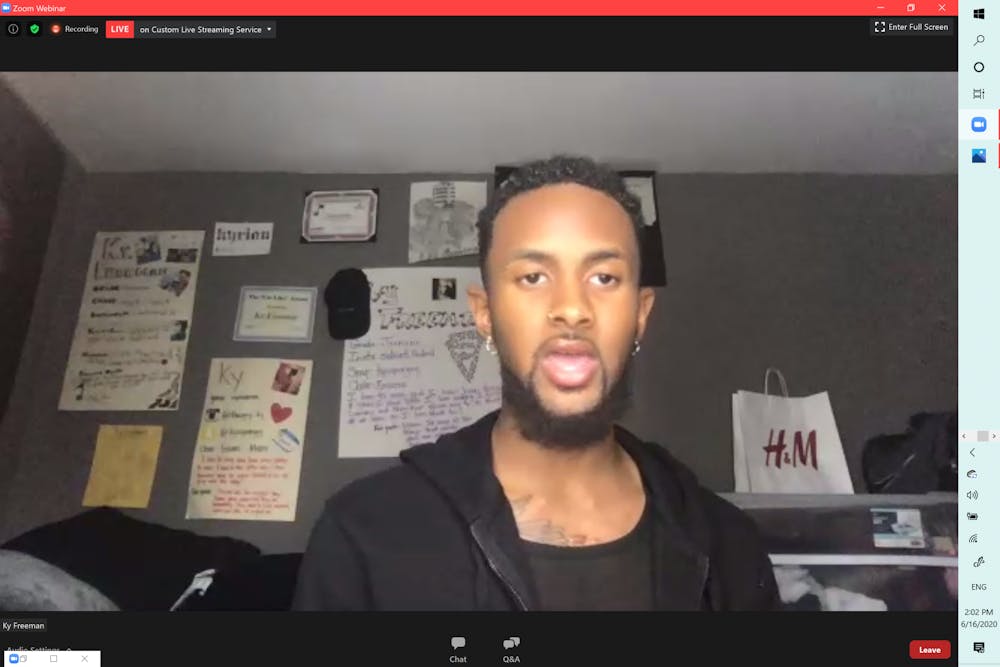Walking around the IU Bloomington campus, Black Student Union president Ky Freeman said he feels like another statistic. In emails from IU, he sees empty promises and hypocritical statements.
Freeman and others discussed their experiences at IU in an university town hall meeting Tuesday regarding racial equity, public safety and changes the university could implement.
From having conversations to dismantling the system and rebuilding it, panelists said things have to change in IU administration, police, employee recruitment and individuals' thoughts.
Freeman said he’s no longer going to accept microreforms and wants to see actual change at IU. Freeman’s frustration is the same frustration IU Northwest assistant professor Marsheila Harris experienced when she was a student at IU Northwest. As a faculty member, she said her experience at IU got better but didn't start out as well as it could have.
“I feel like I have support now from others, but it took me a while to have that feeling of belonging in my home campus on my home turf in my home city,” Harris said in the meeting.
She talked about how her ideals and thoughts were dismissed. She got funny looks. She felt unwanted by the majority. She said it’s important to recognize there are people still experiencing this discomfort.
Wayne James talked about an instance last year when he was on an IU campus with a colleague when the police were called on him because he looked like “a suspicious Black man.” He is the IUPD chief diversity officer. This town hall meeting was planned after George Floyd was killed in Minneapolis by police and his death sparked nationwide protests of police brutality and systemic racism.
“I feel the pain because I have been on both sides of that,” James said.
James said he knows there is a lot of work to be done, but it is hard to know if these calls about a “suspicious” person are legitimate, and they don’t want to create a safety concern for the person who called.
Sydney Rucker, director of diversity initiatives at the IU School of Medicine, said people should think about why they are calling the police. On a broader scale, she considers police brutality a health crisis. She thinks it’s essential for the medicine and police communities to have dialogue with one another about health disparities, especially in the Black community.
The panel also discussed the recruitment of IU police officers. James said they’ve put together a diverse recruitment team over the past year with a firm emphasis on equity and inclusion. They vet applicants, doing a thorough background check and even talking to their neighbors to ensure they are not hiring someone with biases.
This same idea of recruitment and hiring was discussed regarding the university. James Wimbush, vice president for diversity, equity, and multicultural affairs, said there needs to be a more thorough assessment of various practices regarding faculty, staff, students and administration. This includes looking at processes of recruitment, retention, promotion, tenure and pathways to administration and advancement.
“If you look at the cabinet of vice presidents to the president, there’s only one person there that looks like me,” Wimbush said.
However, Freeman said he doesn't want IU to make changes just for PR purposes. Even if more people of color are hired, those people have to be protected and given support because they are lines of support to their students, Freeman said.
“A starting point has to be representation, but all too often that’s where the conversation ends,” said John Whelan, vice president for human resources for IU. “And if we don’t have an environment that is welcoming and inclusive to all, then what is the value of the diversity?”
Wimbush also said people that enter the university need to be trained in racial issues, classes need to focus on diverse issues and there needs to be a diversity pledge. This would allow for people who enter the university to be held accountable for the way they treat people.
For SupportLinc EAP representative Roosevelt Cohens, his first experience at a predominantly white institution (PWI) was traumatizing. Being born in the 50s, he said he’s heard a lot of white people ask how they can help throughout time. The first thing he said for them to do is examine themselvesand the reality of systemic racism.
Whelan said there's a difference in one bad person saying a racist thing and the fact that in today’s society he as a white person has a statistical advantage over a black person in a job and getting a job.
“To create true equity, we have to truly shift the balance of power," he said. "It can not just be white people in power lifting up Black people."
But without having one-on-one conversations with racist people within the university community, the piece of equity and inclusion doesn’t matter because people have the same old practices, Harris said.
Multiple panelists explained the importance of people educating themselves, but made it clear it does not end there. Freeman said a mentor of his says they do not want allies. They want accomplices to take action and build real relationships with Black people.
“It won’t be until we truthfully see one another as solely humans and appreciate rather than focus on our differences that we can come together and live in peace and solidarity,” James said.




